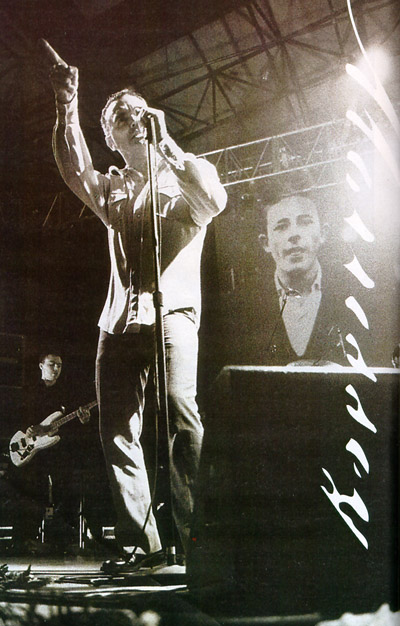While only film director John Hughes did a better job chronicling awkward adolescence in
the 80's, Morrissey — like Hughes' favorite star, Molly Ringwald — hangs in a
nostalgic netherworld that is frozen so indelibly in alternative culture's consciousness
that his new work could never touch people the same way it once did. Of course, it hasn't
helped that his solo albums have been a decidedly mixed bag — eight releases that
probably amount to little more than one truly stellar album among them.
Sadly, Morrissey's Sept. 17 Central Park show was largely a lackluster and oddly lifeless
affair — shocking since his other Stateside tours have been frenzied, chaotic and
electrifying, especially with fans rushing the stage for hugs and Morrissey basking in the
adulation. Threatening signs posted near the Central Park stage warned against would-be
interlopers. If the message — "Any attempt to get up on stage will result in
ejection" — wasn't clear, the boot underneath it drove the point home. No one
even tried.
More than the controlled crowd, however, Morrissey's set list left much to be desired. He
touched 1992's Your Arsenal only briefly [he did?] and went no earlier into his
solo career. While the selections from 1995's Southpaw Grammar had a fiery fervor,
especially "The Teachers Are Afraid Of The Pupils" [is he reviewing the right show?] and the breathless "Boyracer," most of the material from this year's Maladjusted
seemed stultifyingly slow. The pacing seemed all off: The middle of the set creeped along,
and the crowd, looking for a reason to rejoice, received few familiar songs. After little
more than an hour, with a farewell statement of "Goodnight. I love you," he was
gone.
Does Morrissey still have a devoted audience? Absolutely. But it seems a very different
one from the Smiths crowd, who, perhaps thanks to the Smiths, have grown from confused
teens into well-adjusted adults. Fans had lined up outside the gates starting at 7 a.m.
the day of the concert. Many sported different varieties of Morrissey t-shirts, carried
gladioli and daisies and talked about how their fandom bonded strangers as friends during
the long wait to get into the concert venue. So perhaps it's not too surprising that
barely a ripple passed through the crowd when Morrissey dug back to the Smiths' Strangeways,
Here We Come for a sparkling rendition of "Paint A Vulgar Picture."
His one-song encore, the Smiths nugget "Shoplifters Of The World Unite,"
however, did set off a frenzy. Momentarily, it was a reminder of Morrissey's glory —
that now, today, tomorrow and always, those Smiths albums remain available to guide
countless confused kids through troubled years. |
|
